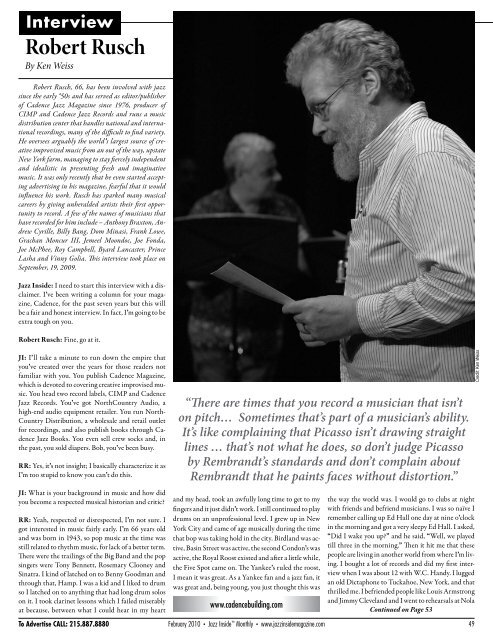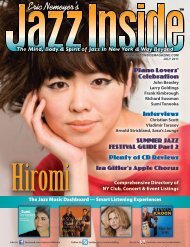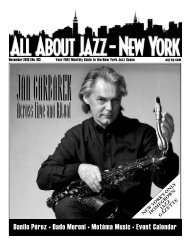February 2010 issue - Jazz Singers.com
February 2010 issue - Jazz Singers.com
February 2010 issue - Jazz Singers.com
Create successful ePaper yourself
Turn your PDF publications into a flip-book with our unique Google optimized e-Paper software.
Interview<br />
Robert Rusch<br />
By Ken Weiss<br />
Robert Rusch, 66, has been involved with jazz<br />
since the early ‘50s and has served as editor/publisher<br />
of Cadence <strong>Jazz</strong> Magazine since 1976, producer of<br />
CIMP and Cadence <strong>Jazz</strong> Records and runs a music<br />
distribution center that handles national and international<br />
recordings, many of the difficult to find variety.<br />
He oversees arguably the world’s largest source of creative<br />
improvised music from an out of the way, upstate<br />
New York farm, managing to stay fiercely independent<br />
and idealistic in presenting fresh and imaginative<br />
music. It was only recently that he even started accepting<br />
advertising in his magazine, fearful that it would<br />
influence his work. Rusch has sparked many musical<br />
careers by giving unheralded artists their first opportunity<br />
to record. A few of the names of musicians that<br />
have recorded for him include – Anthony Braxton, Andrew<br />
Cyrille, Billy Bang, Dom Minasi, Frank Lowe,<br />
Grachan Moncur III, Jemeel Moondoc, Joe Fonda,<br />
Joe McPhee, Roy Campbell, Byard Lancaster, Prince<br />
Lasha and Vinny Golia. This interview took place on<br />
September, 19, 2009.<br />
<strong>Jazz</strong> Inside: I need to start this interview with a disclaimer.<br />
I’ve been writing a column for your magazine,<br />
Cadence, for the past seven years but this will<br />
be a fair and honest interview. In fact, I’m going to be<br />
extra tough on you.<br />
Robert Rusch: Fine, go at it.<br />
JI: I’ll take a minute to run down the empire that<br />
you’ve created over the years for those readers not<br />
familiar with you. You publish Cadence Magazine,<br />
which is devoted to covering creative improvised music.<br />
You head two record labels, CIMP and Cadence<br />
<strong>Jazz</strong> Records. You’ve got NorthCountry Audio, a<br />
high-end audio equipment retailer. You run North-<br />
Country Distribution, a wholesale and retail outlet<br />
for recordings, and also publish books through Cadence<br />
<strong>Jazz</strong> Books. You even sell crew socks and, in<br />
the past, you sold diapers. Bob, you’ve been busy.<br />
RR: Yes, it’s not insight; I basically characterize it as<br />
I’m too stupid to know you can’t do this.<br />
JI: What is your background in music and how did<br />
you be<strong>com</strong>e a respected musical historian and critic?<br />
RR: Yeah, respected or disrespected, I’m not sure. I<br />
got interested in music fairly early. I’m 66 years old<br />
and was born in 1943, so pop music at the time was<br />
still related to rhythm music, for lack of a better term.<br />
There were the trailings of the Big Band and the pop<br />
singers were Tony Bennett, Rosemary Clooney and<br />
Sinatra. I kind of latched on to Benny Goodman and<br />
through that, Hamp. I was a kid and I liked to drum<br />
so I latched on to anything that had long drum solos<br />
on it. I took clarinet lessons which I failed miserably<br />
at because, between what I could hear in my heart<br />
“There are times that you record a musician that isn’t<br />
on pitch… Sometimes that’s part of a musician’s ability.<br />
It’s like <strong>com</strong>plaining that Picasso isn’t drawing straight<br />
lines … that’s not what he does, so don’t judge Picasso<br />
by Rembrandt’s standards and don’t <strong>com</strong>plain about<br />
Rembrandt that he paints faces without distortion.”<br />
and my head, took an awfully long time to get to my<br />
fingers and it just didn’t work. I still continued to play<br />
drums on an unprofessional level. I grew up in New<br />
York City and came of age musically during the time<br />
that bop was taking hold in the city. Birdland was active,<br />
Basin Street was active, the second Condon’s was<br />
active, the Royal Roost existed and after a little while,<br />
the Five Spot came on. The Yankee’s ruled the roost,<br />
I mean it was great. As a Yankee fan and a jazz fan, it<br />
was great and, being young, you just thought this was<br />
www.cadencebuilding.<strong>com</strong><br />
the way the world was. I would go to clubs at night<br />
with friends and befriend musicians. I was so naïve I<br />
remember calling up Ed Hall one day at nine o’clock<br />
in the morning and got a very sleepy Ed Hall. I asked,<br />
“Did I wake you up?” and he said, “Well, we played<br />
till three in the morning.” Then it hit me that these<br />
people are living in another world from where I’m living.<br />
I bought a lot of records and did my first interview<br />
when I was about 12 with W.C. Handy. I lugged<br />
an old Dictaphone to Tuckahoe, New York, and that<br />
thrilled me. I befriended people like Louis Armstrong<br />
and Jimmy Cleveland and I went to rehearsals at Nola<br />
Continued on Page 53<br />
To Advertise CALL: 215.887.8880 <strong>February</strong> <strong>2010</strong> • <strong>Jazz</strong> Inside Monthly • www.jazzinsidemagazine.<strong>com</strong> 49<br />
Credit: Ken Weiss




